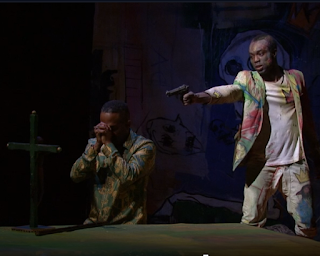Changing Interpretations Over Time: A C Bradley
Now we reach the twentieth century in our journey into changing interpretations of Hamlet over time.
A C Bradley (1851-1935) - 'Andrew Cecil', in case you were wondering - was known as a Shakespearian scholar and literary critic. He wrote this:
He was another Oxford graduate who held the Professor of Poetry role there between 1901 and 1906.
His psychological approach to the analysis of Shakespeare’s characters is considered to anticipate post-Freudian criticism. In this extract we return to the frequently discussed idea of Hamlet's inaction, but with some psychological insight and explanation.
A. C. BRADLEY: from Shakespearean Tragedy, 1904
Let me try to show now, briefly, how much this melancholy accounts for.
It accounts for the main fact, Hamlet's inaction. For the immediate cause of that is simply that his habitual feeling is one of disgust at life and everything in it, himself included, - a disgust which varies in intensity, rising at times into a longing for death, sinking often into weary apathy, but is never dispelled for more than brief intervals. Such a state of feeling is inevitably adverse to any kind of decided action; the body is inert, the mind indifferent or worse; its response is, 'it does not matter', 'it is not worthwhile', and ‘it is no good'.
And the action required of Hamlet is very exceptional. It is violent, dangerous, difficult to accomplish perfectly, on one side repulsive to a man of honour and sensitive feeling, on another side involved in a certain mystery (here come in thus, in their subordinate place, various causes of inaction assigned by various theories). These obstacles would not suffice to prevent Hamlet from acting, if his state were normal; and against them there operate, even in his morbid state, healthy and positive feelings, love of his father, loathing of his uncle, desire of revenge, desire to do duty.
But the retarding motives acquire an unnatural strength because they have an ally in something far stronger than themselves, the melancholic disgust and apathy; while the healthy motives, emerging with difficulty from the central mass of diseased feeling, rapidly sink back into it and 'lose the name of action'. We see them doing so; and sometimes the process is quite simple, no analytical reflection on the deed intervening between the outburst of passion and the relapse into melancholy.
But this melancholy is perfectly consistent also with that incessant dissection of the task assigned, of which the Schlegel-Coleridge theory makes so much. For those endless questions (as we may imagine them), 'Was I deceived by the Ghost? How am I to do the deed? When? Where? What will be the consequence of attempting it - success, my death, utter misunderstanding, and mere mischief to the State? Can it be right to do it, or noble to kill a defenceless man? What is the good of doing it in such a world as this?' - all this, and whatever else passed in a sickening round through Hamlet's mind, was not the healthy and right deliberation of a man with such a task, but otiose thinking hardly deserving the name of thought, an unconscious weaving of pretexts for inaction, aimless tossing’s on a sick bed, symptoms of melancholy which only increased it by deepening self-contempt.
What are the main ideas in Bradley's argument? Summarise them in your own words.
Might any still have resonance today? Why/not? Give examples from Hamlet to support your ideas. How does this compare with some of the perspectives that we have read previously?
Is there a memorable, standout phrase?




Comments
Post a Comment